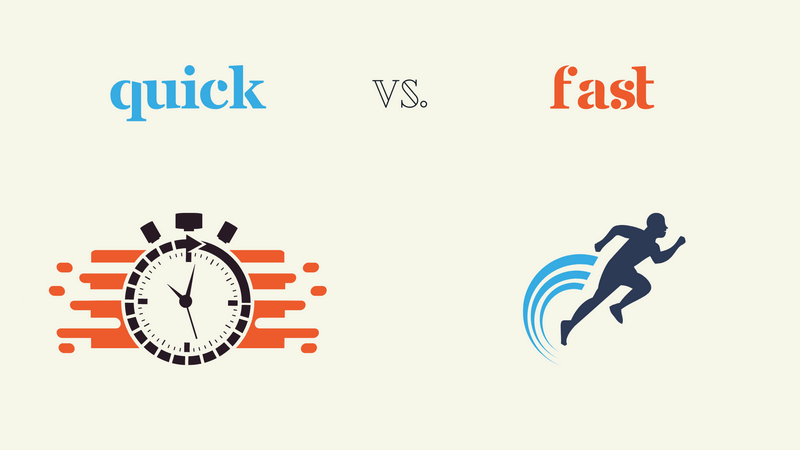Fast vs. Quick vs. Quickly: Spot the Difference!
The words fast, quick, and quickly are often used interchangeably in everyday conversation, but there are subtle differences in their usage and meaning. Understanding when to use each term can enhance your writing and communication skills, ensuring that you convey your message with precision. In this article, we will break down these three commonly confused words and explain the differences between quick vs fast vs quickly.

What Does “Fast” Mean?
“Fast” is primarily an adjective used to describe the speed of something or someone. It refers to how swiftly something moves, operates, or occurs. For example, when describing a car or a runner, fast conveys a sense of high speed or rapid motion.
Examples of “fast” in a sentence:
- The fast car zoomed down the highway.
- He is a fast runner, capable of completing a 5K in under 20 minutes.
It’s important to note that "fast" is not used to describe actions or behaviors directly. Instead, it is reserved for things, people, or processes that have the quality of speed.
What Does “Quick” Mean?
“Quick” is another adjective that also conveys the idea of speed, but it is more commonly used to describe actions or responses rather than the inherent speed of things or people. It implies that something happens with little delay or in a short amount of time.
Examples of “quick” in a sentence:
- She gave a quick response to the question.
- They made a quick decision to leave the party early.
While fast describes the speed of something, quick is often used when talking about how swiftly something is done or how soon something happens.
The Adverb “Quickly”
When you need to describe the manner in which an action is performed, quickly is the adverb form of “quick.” It is used to modify verbs and indicates that the action is done with speed. Unlike the adjectives fast and quick, quickly describes how something happens, not the thing or person performing the action.
Examples of “quickly” in a sentence:
- She ran quickly to catch the bus.
- They completed the task quickly.
Note that while fast and quick are typically used to modify nouns, quickly modifies verbs. Therefore, quickly is the correct choice when you want to describe how an action is carried out.
Fast vs Quick: When to Use Each Word
While both fast and quick describe speed, their use depends on the context and the part of speech needed.
Use fast when referring to the speed of something or someone, particularly when describing the inherent quality of an object or person.
- Example: The fast train arrived ahead of schedule.
Use quick when referring to the speed of an action or the shortness of time it takes to complete something.
- Example: He gave a quick answer to the question.
Quick vs Quickly: Understanding the Adverbial Difference
The distinction between quick and quickly is straightforward. Quick is an adjective that modifies nouns, while quickly is an adverb that modifies verbs. This difference is important because using the wrong form of the word can lead to grammatical errors.
Quick (adjective): Modifies nouns or pronouns.
- Example: She has a quick mind.
Quickly (adverb): Modifies verbs, adjectives, or other adverbs.
- Example: She solved the problem quickly.




